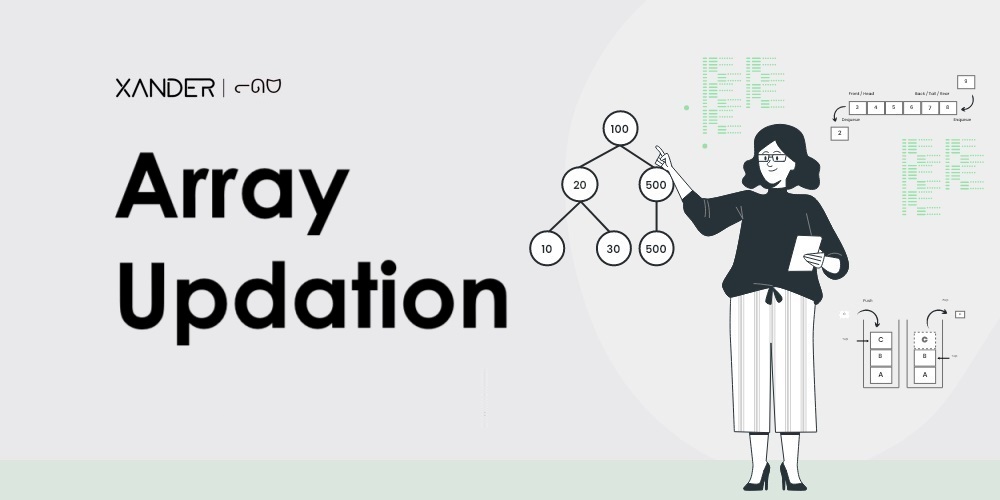Array Updation : A Comprehensive Guide
 Xander Billa
Xander Billa
Introduction
Arrays are fundamental data structures in programming, allowing us to store and manipulate collections of elements. In this blog post, we will explore different methods of updating arrays in C++. Specifically, we'll focus on updating elements at the end, at the beginning, and at a specific position (k-th position) within an array.
Updating Array at the End
Updating an array at the end involves modifying the last element of the array.
Pseudocode
function updateArrayAtEnd(array, newValue):
array[length(array) - 1] = newValue
C++ Program
#include <iostream>
using namespace std;
int main() {
const int size = 5;
int arr[size] = {1, 2, 3, 4, 5};
// Update array at the end
int newValue = 10;
arr[size - 1] = newValue;
// Display the updated array
cout << "Updated Array at the End: ";
for (int i = 0; i < size; i++) {
cout << arr[i] << " ";
}
return 0;
}
Updating Array at the Beginning
Updating an array at the beginning involves modifying the first element of the array.
Pseudocode
function updateArrayAtBeginning(array, newValue):
array[0] = newValue
C++ Program
#include <iostream>
using namespace std;
int main() {
const int size = 5;
int arr[size] = {1, 2, 3, 4, 5};
// Update array at the beginning
int newValue = 10;
arr[0] = newValue;
// Display the updated array
cout << "Updated Array at the Beginning: ";
for (int i = 0; i < size; i++) {
cout << arr[i] << " ";
}
return 0;
}
Updating Array at a Specific Position (k-th Position)
Updating an array at a specific position involves modifying the element at a given index (k-th position).
Pseudocode
function updateArrayAtKPosition(array, k, newValue):
array[k] = newValue
C++ Program
#include <iostream>
using namespace std;
int main() {
const int size = 5;
int arr[size] = {1, 2, 3, 4, 5};
// Update array at a specific position (3rd position in this case)
int k = 2; // Note: Arrays are zero-indexed
int newValue = 10;
arr[k] = newValue;
// Display the updated array
cout << "Updated Array at Position " << k + 1 << ": ";
for (int i = 0; i < size; i++) {
cout << arr[i] << " ";
}
return 0;
}
Conclusion
In this blog post, we covered different methods of updating arrays in C++. Understanding how to update elements at the end, at the beginning, and at specific positions is crucial for efficient array manipulation in various programming scenarios. Happy coding!
Subscribe to my newsletter
Read articles from Xander Billa directly inside your inbox. Subscribe to the newsletter, and don't miss out.
Written by

Xander Billa
Xander Billa
Myself Vikas Singh from Varanasi, Uttar Pradesh. Learning and exploring technical domains at Acharya Institute, Bangalore (IN) from the last two years. The main goal is to learn as much domains, tool